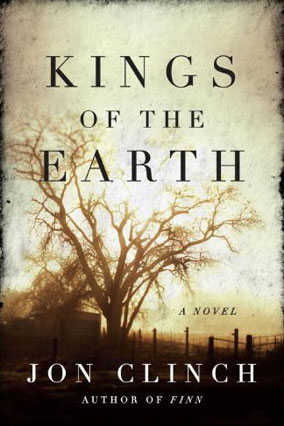The Proctor Boys are a strange lot – three grizzled old men who have spent their entire lives in stifling isolation on a dairy farm in Upstate New York. When the eldest, Vernon, winds up dead one morning in the bed all three shared, the youngest, Creed, gets swept up into accusation while the emotionally crippled simpleton (and middle brother), Audie, barely grasps the gravity of the situation.
Jon Clinch’s second novel, Kings of the Earth, was inspired by actual events. Clearly fashioning himself a 21st century William Faulkner, Clinch spans his book across generations and voices. Each chapter is titled by a year and a character’s name – with POV’s shifting from 1st person to 2nd person to 3rd person, but never omniscient – eerily reminiscent of Faulkner’s As I Lay Dying and The Sound and the Fury. Those not familiar with the style may find it a challenge, while fans of Faulkner will probably favor it as a nice homage, but it pales in comparison to the master. This isn’t to say Clinch hasn’t achieved something memorable nearing mythic stature here.
Take for instance his vision of the Proctor Boys through the eyes of their younger sister, Donna, after she has escaped the farm for a more civilized and normal life:
Her brothers moved like ghosts of drowned men traversing the ocean floor. Their pale hair and their pale beards wavered in the light wind as on deep currents. They went slowly and methodically, as if they and their arms were older than time and long past any need for urgency. The longer she lived in town, the more she took note of this antique strangeness of theirs. (page 152)
Clinch weaves a gritty and textured view of a way of life now dead and gone, and he fashions these Proctor brothers as something ancient and rooted in the ground – eidolons of a bygone era still tethered to the earth by sheer stubbornness and fortitude. The interwoven voices in which Clinch tells not only their tale, but the story of the community around them, reach various levels of success. Though Audie is described by others as someone who can barely speak a word coherently, his voice is different from his brothers’ only in its brevity. The ever-present family friend Preston is given the clearest voice (and the voice of reason and morality), while the conniving DeAlton (Donna’s husband) is equally memorable for his 2nd-person fast-talking.
Unlike another contemporary Faulknerian writer, Toni Morrison – who is both more flowery and paradoxically concise in her prose – Clinch pads his pages with unnecessary side stories and repetitive descriptions of the dirt and stench that permeates the Proctors’ world. He also spends far too much time with a banal subplot involving Donna’s son, Tom, who uses his uncles’ farm as a place to grow his marijuana business. Only in the end, when Clinch lets all the pieces fall too neatly into place, does the reader realize the purpose of the subplot.
The most powerful passages are those that dive deep into the family’s history, back to when the Proctor brothers really were boys. A story from 1932 (interspersed into the latter third of the novel) detailing a winter-time fishing trip with Vernon, Audie and their father undulates vividly under varying shades of small joys and the stark horrors of rural living that slap the reader in the face. What shines through, however, especially in these chapters, is not the misery but the humanity…and Clinch is not ashamed to show his sympathy for this seemingly cursed lot.
While at times overplaying his hand in showcasing the backwoods’ exoticism of the Proctor family, Clinch is clear in his mission. Everyone has a story…a past…a tradition. And sometimes simpletons with secrets don’t even know what they know…yet know enough to know that the strongest desire in any man is often the desire to fly away home. And sometimes that home is a pile of dirt and ruins upon which you can sit as a king.
Written by David H. Schleicher


Bonjour! D.H.Schleicher
Wow! What a very interesting post and it seems as if this will be a very interesting book (King of the Earth” by Jon Clinch ) to add to the library shelf.
I wonder if this book and the subject matter can be translated to the big screen.
The authors name(s) in the tags along are enough for me to want to purchase this book.
Oh! Yes, I have read this post earlier and sent it over there to Twitter.
Merci, for sharing!
DeeDee 😉
DeeDee – I believe the true events that inspired this piece of fiction also inspired a documentary film from 1992 entitled Brother’s Keeper. I can’t imagine the book translating too well to screen as a fictional narrative. — DHS
First I’ve heard of this David, but I wasn’t looking. As always when it comes to literature, you are peerless, and you’ve definitely caught my attention here with your engaging description and the comparisons to Faulkner and Morrison.
Sam – the setting (Upstate New York) and the Faulkner comparisons obviously drew me in. –DHS